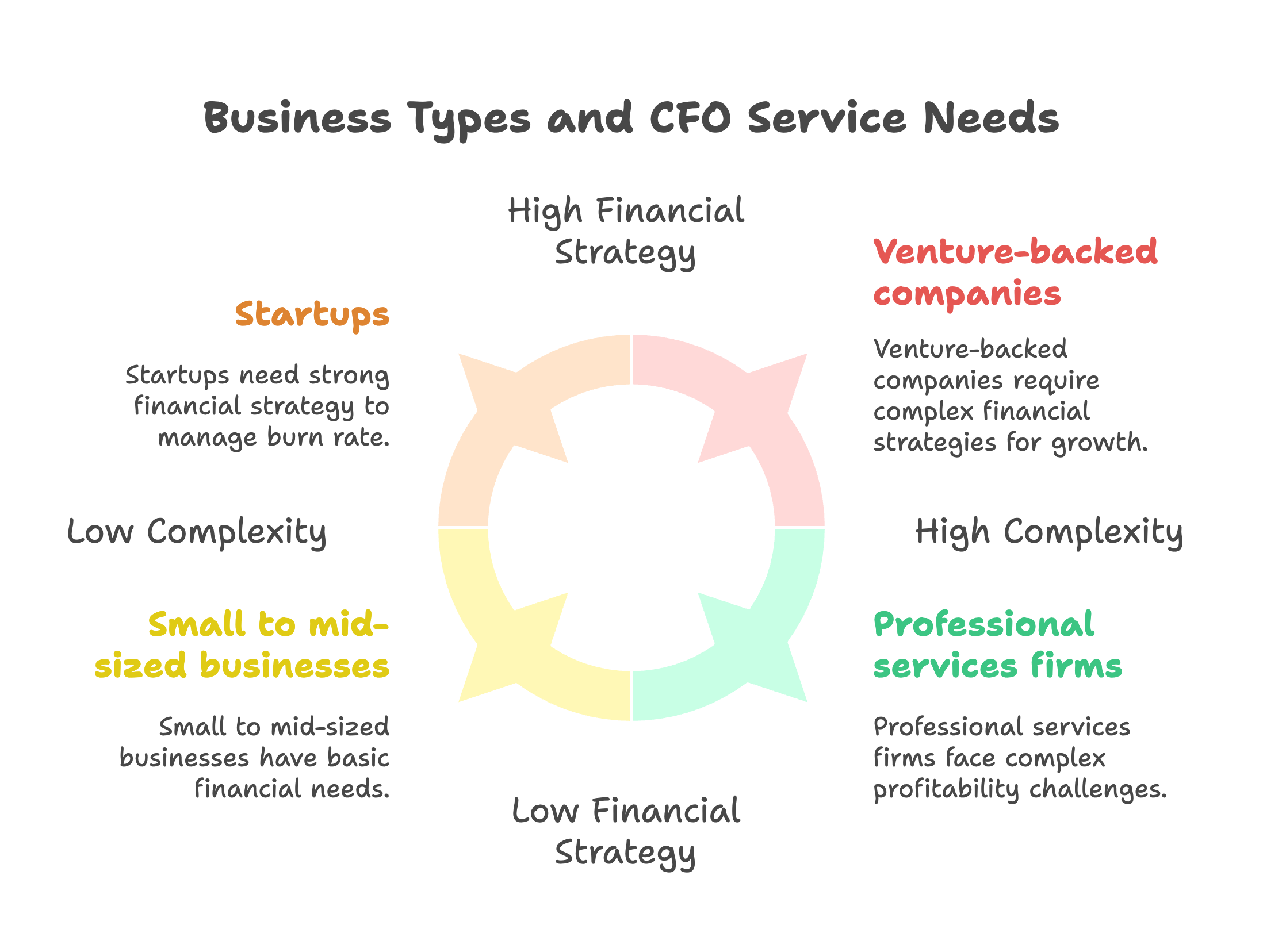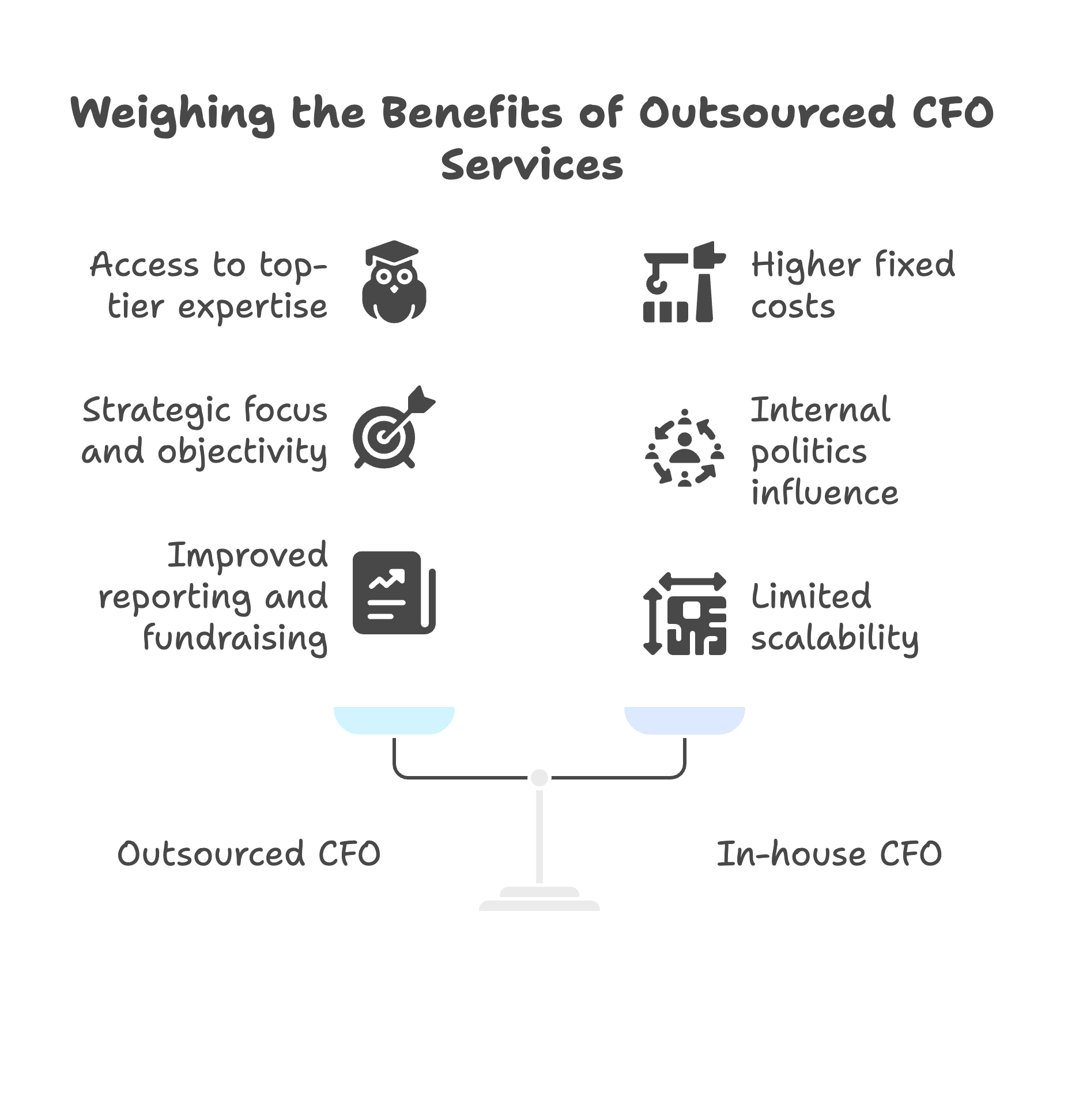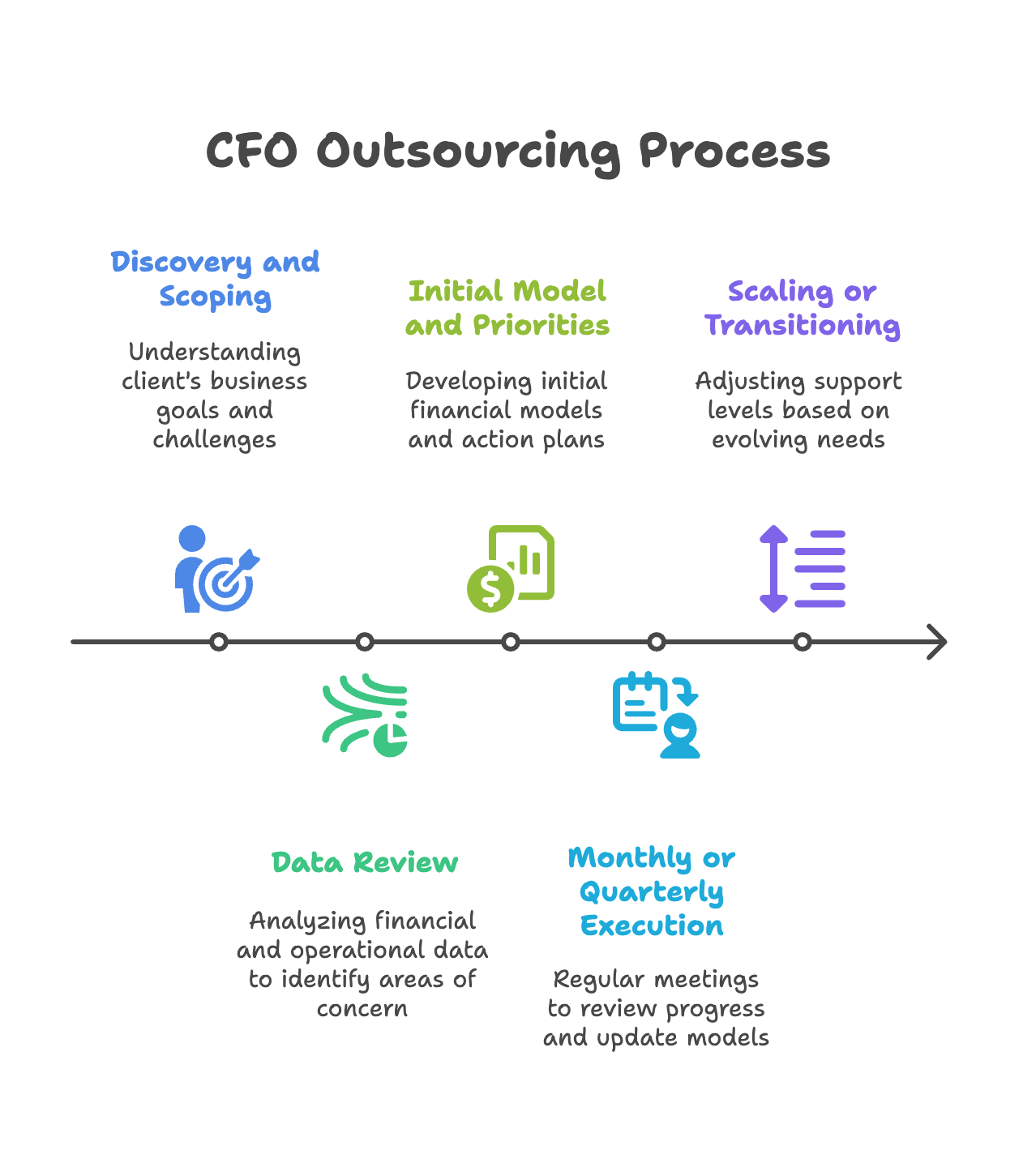Every business hits a point where basic bookkeeping is no longer enough. As financial decisions become more complex, leadership teams need more than just compliance and reporting. They need strategy. They need guidance. They need the skills of a Chief Financial Officer.
But hiring a full-time CFO is expensive. Most small and mid-sized businesses cannot justify the cost. That is where CFO outsourcing services come in.
Outsourcing this function allows companies to access executive-level financial leadership at a fraction of the cost. Whether it is cash flow forecasting, pricing strategy, fundraising support, or financial system setup, outsourced CFOs step in to deliver what growing companies need. Clarity, direction, and financial discipline.
For CPA firms, outsourced CFO services represent both an opportunity and a solution. Your firm can use this model to enhance its own internal financial operations, or to offer high-value advisory services to clients without expanding headcount.
Madras Accountancy supports U.S.-based CPA firms with offshore CFO support that brings strategic finance within reach. From budgeting and forecasting to investor reporting and performance tracking, we help firms and their clients unlock clarity without committing to full-time hires.
In this guide, we explore what CFO outsourcing actually includes, why it matters for growing businesses, and how CPA firms can use it to scale smarter and serve clients more deeply.
As companies grow, financial complexity increases. Early on, founders or managers can handle most of the financial responsibilities themselves. A bookkeeper or accounting professional may handle basic entries, payroll, and tax filing. But this system quickly reaches its limits.
Eventually, someone needs to answer tougher questions:
These are questions that only a seasoned finance leader can answer well. Without one, businesses are forced to guess. That leads to poor planning, reactive decision-making, and lost opportunities.
Hiring a full-time CFO costs anywhere from $150,000 to $300,000 annually, not including bonuses or benefits. For most startups and growing businesses, that level of spend is unrealistic.
CFO outsourcing services provide a middle path. Companies get experienced financial leadership on a flexible schedule and budget, customized to their growth stage and goals.
CFO outsourcing is the process of hiring a part-time, fractional, or project-based Chief Financial Officer to manage key financial functions. This can be done directly with the client company or facilitated through a CPA firm that manages the relationship.
These services are tailored to meet the strategic and operational financial needs of a company, without the cost or commitment of a full-time executive.
Common services include:
Some CFOs also serve as a financial sounding board for CEOs or founders, offering perspective and accountability. In many cases, they work closely with the existing controller or accounting team to ensure accurate financial statements and reporting.
These services can be structured as part-time, temporary (for a project or crisis), or long-term recurring engagements. Companies may also seek interim CFO support during transitions or while searching for a permanent hire.

CFO outsourcing is useful across a wide range of business types. These include:
Startups may have strong technical or product leadership, but lack financial strategy. An outsourced CFO can help them understand their burn rate, project runway, prepare for funding, and build investor-ready financial statements.
As companies grow, their accounting systems become more complex. They need help with financial planning, inventory costing, process automation, and strategic guidance. An outsourced CFO supports the owner and internal accounting staff with structure and insight.
Companies that have raised funds often face pressure from investors to report clearly and manage capital responsibly. CFOs help align spending with growth goals and create the financial infrastructure expected by stakeholders.
These businesses run on billable time and tight margins. CFOs help track profitability by client or service line, improve pricing, and forecast hiring needs while working with the controller to ensure accurate reporting.
CFOs help these companies manage inventory cycles, understand gross margins, allocate ad spend, and optimize fulfillment costs.
CPA firms are in a unique position to offer outsourced CFO services to their clients. Many clients already trust their CPA for compliance, tax, or basic accounting services. By adding CFO-level support, the firm can deepen relationships, expand value, and generate new recurring revenue.
Here are three ways CPA firms use outsourced CFO services:
Firms can offer part-time CFO support to clients who need more than accounting but are not ready to hire in-house. This keeps the client relationship in-house and prevents them from seeking help elsewhere.
Even CPA firms need structured financial planning. Many small firms operate without budgets, forecasts, or clear KPIs. An outsourced CFO can help partners manage cash flow, pricing, utilization, and growth planning.
If a client is preparing to raise capital, expand to new locations, or invest heavily in operations, they may need temporary CFO expertise. The firm can bring in outsourced support to handle the planning and reporting needs during this critical period.
By partnering with an offshore firm like Madras Accountancy, CPA firms can deliver these services without hiring internally. This keeps costs predictable while still offering high-impact support from a qualified financial expert.

Outsourcing the CFO function creates a number of advantages for both businesses and CPA firms.
Most outsourced CFOs have years of experience in multiple industries. They bring deep financial knowledge, which includes handling investor relations, cash crises, restructurings, and rapid growth. This allows smaller businesses to access insights normally reserved for large companies.
Hiring a full-time CFO can be cost-prohibitive. Outsourcing provides flexibility. You can scale up or down depending on your current needs and budget. There are no long-term contracts, benefits, or onboarding costs.
CFO services go beyond compliance. They provide strategic guidance based on forward-looking data. This includes decisions about expansion, financing, pricing, and long-term planning.
Outsourced CFOs are not emotionally tied to internal politics or past decisions. They bring a fresh, objective view. That can help founders and owners make clearer, faster choices.
CFOs create clean reports that highlight key metrics. These include cash flow forecasts, budget-to-actuals, department-level performance, and profitability by project or customer. This clarity helps leadership teams stay focused on the right goals.
Investors and lenders require strong financial documentation. CFOs prepare data rooms, pitch materials, cap tables, and financial models that make the business easier to evaluate. For audits, they ensure records are ready and compliant.
Not every provider is equipped to offer true CFO-level guidance. Whether you are hiring for your own firm or on behalf of clients, here is what to look for.
Choose a provider who understands your industry. A CFO who has worked in SaaS may not be the best fit for a logistics business. Ask for client examples or case studies to verify fit.
Your CFO must be able to build and maintain accurate models. These include cash flow projections, operating budgets, and forecasting tools. Ask about their modeling approach and tools used.
CFOs must translate financial data into clear action steps. Look for someone who can explain complex issues simply and provide recommendations, not just numbers.
If you are working with an offshore team, ensure they understand U.S. GAAP, IRS expectations, and SEC-level documentation. This is especially important if your business may seek investors or lenders in the U.S.
You will be sharing sensitive financial data. Your partner must have clear policies for data security, limited access, and non-disclosure.
Madras Accountancy meets these standards and supports firms with trained finance professionals who work within your preferred tools, templates, and timelines.

At Madras Accountancy, our outsourced CFO support follows a structured process designed for CPA firms and their clients.
We learn about your firm or your client's business. This includes understanding goals, challenges, team structure, and current financial systems.
We request access to past financials, payroll data, expense records, and operational metrics. This helps us identify strengths, weaknesses, and immediate areas of concern.
We build a first version of the budget, forecast, or dashboard. We also recommend an action plan for the first 90 days, which may include cash management, pricing updates, or reporting changes.
We meet regularly to review reports, track progress, update models, and make course corrections. This includes preparing board or investor materials if needed, often working alongside the controller to ensure accurate financial statements.
As needs evolve, we adjust support levels. Some clients reduce CFO hours once systems are in place. Others scale up during a growth push or fundraising round.
This approach keeps your costs predictable and your strategy consistent.
A 20-person consulting firm had strong revenue but constant cash shortfalls. The partners could not figure out why. An outsourced CFO reviewed billing cycles, vendor payments, and payroll timing. Within 30 days, they restructured payment terms, adjusted spending schedules, and restored consistent positive cash flow.
The founder had closed a pre-seed round but needed stronger financials to raise their next round. An outsourced CFO from Madras Accountancy cleaned up the books, built a five-year financial model, and prepared investor-ready pitch materials. The founder secured a $2.5 million Series A in under 90 days.
A mid-sized CPA firm wanted to expand advisory services. By offering CFO support through an offshore partner, they added a new revenue stream without hiring internally. They now bundle strategic planning, tax, and reporting services for a monthly fee.
CFO outsourcing services help growing businesses make smarter decisions, manage risk, and operate with confidence. These services bridge the gap between basic accounting and strategic financial leadership. They allow companies to access experienced guidance without taking on the cost of a full-time executive.
For CPA firms, outsourcing the CFO function is not just a client service. It is a growth opportunity. It deepens your value, strengthens retention, and opens new revenue lines.
Madras Accountancy supports CPA firms with offshore CFO services designed to scale. Our team integrates into your workflow, strengthens client outcomes, and helps you lead with insight, not guesswork.
If you are ready to bring CFO-level guidance to your firm or your clients, we are ready to support you.

A practical comparison of hiring a freelancer vs using a dedicated offshore accounting team, focusing on continuity, quality control, security, and scaling.

How CPA firms outsource payroll and 1099 work to reduce penalties and admin load, with a clean workflow for approvals, filings, and year-end reporting.

Practical do's and don'ts for CPA firms outsourcing accounting work, based on common failure points and what successful rollouts do differently.